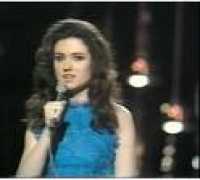Gigliola Cinquetti (born 20 December 1947, Verona, Italy) is an Italian singer, TV presenter and journalist.Contents [hide] 1 Biography 2 Sanremo performances 3 Censored in 1974 4 Later career 5 Selected discography 5.1 Single A-sides 6 See also 7 See also 8 References 9 External links
[edit] Biography
At the age of 16 she won the Sanremo Music Festival in 1964 singing "Non Ho L'Età" ("I'm Not Old Enough"), with music composed by Nicola Salerno and lyrics by Mario Panzeri. Her victory enabled her to represent Italy in the Eurovision Song Contest 1964 with the same song, and she went on to claim her country's first ever victory in the event. This became an international success, even entering UK Singles Chart,[1] traditionally unusual for Italian material. In 1966, she recorded "Dio, come ti amo" ("God, How I Love You"), which became another worldwide hit.[citation needed] [edit] Sanremo performances
In the following occasions, Gigliola Cinquetti performed at the Sanremo Music Festival 1964 "Non ho l'età (Per amarti)" - coupled with Patricia Carli 1965 "Ho bisogno di vederti" - coupled with Connie Francis 1966 "Dio come ti amo" - coupled with Domenico Modugno 1968 "Sera" - coupled with Giuliana Valci 1969 "La pioggia" - coupled with France Gall 1970 "Romantico blues" coupled with Bobby Solo 1971 "Rose nel buio" - coupled with Ray Conniff 1972 "Gira l'amore (Caro bebè)" 1973 "Mistero" 1985 "Chiamalo amore"' 1989 "Ciao" 1995 "Giovane vecchio cuore" [edit] Censored in 1974
She returned to fame in Eurovision Song Contest 1974, again representing Italy. Performing the song "Sì" ("Yes"), the music and lyrics of which were written by Mario Panzeri, Daniele Pace, Lorenzo Pilat and Carrado Conti, she finished second behind "Waterloo", sung by Sweden's ABBA.
According to author and historian, John Kennedy O'Connor's, The Eurovision Song Contest - The Official History, the live telecast of her song was banned in her home country by the Italian national broadcaster RAI, as the event partially coincided with the campaigning for the 1974 Italian referendum on divorce which was held a month later in May.[2]
RAI censored the song because of concerns that the name and lyrics of the song (which constantly repeated the word 'Sì') could be accused of being a subliminal message and a form of propaganda to influence the Italian voting public to vote 'Yes' in the referendum.[3] The song remained censored on most Italian state TV and radio stations for over a month.
An English language version of the song, "Go (Before You Break My Heart)", reached number 8 in the UK Singles Chart in June 1974.[1][4] [edit] Later career
One of her other songs, "Alle Porte del Sole" (released in 1973), was re-recorded in English (as "Door of the Sun") and Italian by Al Martino, two years after its initial release, and reached #17 on Billboard's Hot 100 in the United States. Cinquetti's own English version of the song was released as a single by CBS Records in August 1974, with her original 1973 Italian version on the B-side.
Cinquetti went on to co-host the Eurovision Song Contest 1991 with Toto Cutugno, who had brought the event to Italy with his victory in Zagreb the previous year - the country's first win in the contest since her own twenty-six years earlier.
In the 1990s she became a professional journalist and TV presenter, and she currently hosts the current affairs programme Italia Rai on RAI International. [edit] Selected discography [edit] Single A-sides "Non ho l'età" (1964) "Dio, come ti amo" (1966) "Alle porte del sole" (1973) "Sì" (1974) [edit] See also Sanremo Music Festival Eurovision Song Contest Italy in the Eurovision Song Contest Eurovision Song Contest 1974 Sì (song) [edit] See also List of Eurovision Song Contest presenters [edit] References ^ a b Roberts, David (2006). British Hit Singles & Albums (19th ed.). London: Guinness World Records Limited. p. 107. ISBN 1-904994-10-5. ^ O'Connor, John Kennedy. The Eurovision Song Contest - The Official History. Carlton Books, UK. 2007 ISBN 978-1-84442-994-3 ^ Keithm.utvinternet.ie ^ Esctoday.com
